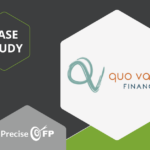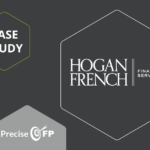The imminent retirement of the baby boomer generation and the consequent transfer of wealth are well-acknowledged factors in the financial advisory landscape. With projections estimating a colossal movement of wealth, ranging from $50 trillion to $68 trillion, from baby boomer parents to their adult children in the coming years, it’s a phenomenon poised to reshape not only the economy but also the entire financial advising industry.
Recently, during a webinar in the 2023 Webinar Roundtable Series hosted by Docupace, prominent financial experts Jeff Vivacqua, David Knock, Kevin Beard, and Megan Hausmann convened to delve into the profound implications of this impending wealth transfer. Their insights shed light on a significant shift, emphasizing that it’s more than just transitioning to younger clientele—it’s an extraordinary opportunity for financial advisors to embrace new growth strategies, setting the stage for a dynamic and prosperous future.
Take Advantage of New Growth Opportunities
The upcoming changes in clients’ lives and financial circumstances can profoundly influence the advisor-client relationship. A financial advisor who is prepared for these financial shifts will use this time of transition as an opportunity to update their business model so they can continue to be profitable in the years ahead.
As baby boomers’ priorities change, so do their financial goals. For many financial advisors, the conventional advice to seek out an ideal type of client — usually older, with a large number of liquid assets and an established investment portfolio — may no longer apply as those clients begin spending, rather than accumulating, assets.
As already-established investors, older clients nearing retirement may begin to favor passive investing over more aggressive strategies. They may not need as much advice as they did before. They may emphasize securing their children’s and grandchildren’s future rather than accruing wealth.
Financial advisors can assist new inheritors of wealth to become the investors of the future. If advisors are prepared to connect with new potential clients and adjust their strategies to match the expectations of a new generation, baby boomers’ retirement can become a growth opportunity rather than a threat to business.
Help Your Clients’ Family Members Achieve Their Goals
When a family member inherits wealth from a client, 90% of heirs will change advisors, but that doesn’t have to be the case for your firm. If you’re already working with one family member, you can build relationships with their spouses and/or children. As your clients’ family members reach important milestones, you can offer to help them navigate through new financial situations, such as investing in a 401(k) or buying their first home.
Money can be a conversational minefield for some families. Emotions, cultures, and values can significantly impact how families and individuals believe money should be earned, invested, and spent. If family members don’t share the same financial priorities, this only increases the potential for tension.
You can coach your clients to hold effective financial planning sessions at home by providing them with resources and information they can use during discussions. You may also want to consider offering webinars, workshops, or other information to help families educate themselves and understand the impact of their financial decisions.
Make the Digital Transformation
To reach a younger clientele and earn their trust, you may need to change the way you do business. Millennials and Generation Z approach investing differently than their parents. They expect information to be easily accessible and to receive updates on demand. When they want to learn information, they are accustomed to educating themselves online. Many younger investors open investment accounts before they ever consult with an advisor. They prefer digital forms of communication and information.
Yet many firms haven’t yet adopted technology as a growth strategy. They may have invested in new technology, but their advisors and employees are not taking advantage of its capabilities or integrating it with their current systems. Their onboarding process for new clients may be disorganized or may take longer than necessary because the firm relies on older documentation methods, making the firm appear outdated.
Technological and financial shifts are coming. If you want to gain the confidence and trust of a new generation, your firm needs to shift its mindset. If you’re willing to embrace the upcoming technological and financial changes, you can provide services that are better aligned with your changing clientele. New clients with different goals, priorities, and expectations will become the investors of the future. Is your firm prepared to meet their needs?
In the complex world of wealth transfer and financial planning, PreciseFP emerges as a game-changing tool. Its ability to facilitate data gathering with current clients, enabling advisors to understand their unique goals and objectives, is invaluable. What sets PreciseFP apart is its foresight – it allows advisors to initiate crucial fact-finding conversations with beneficiaries well in advance, long before the cloud of grief or mourning descends. By leveraging PreciseFP’s capabilities, advisors can proactively shape the future of wealth transfer planning, creating a smoother, more organized, and ultimately more fulfilling experience for all parties involved. It’s not just about preserving wealth; it’s about preserving peace of mind. With PreciseFP, you’re not just planning for the transfer of assets; you’re building a legacy of thoughtful, client-centric financial planning. Discover the power of PreciseFP today and elevate your wealth transfer strategies to a whole new level.







